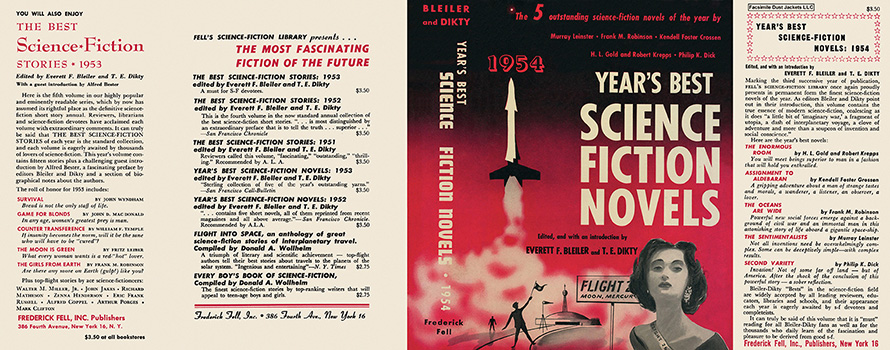
Imagine a planet where crime is encouraged and honesty is discouraged. That’s the premise of Kendell Foster Crossen’s “Assignment in Aldebaran.” I’ve read some of Crossen’s mystery novels under his “Richard Foster”, “M. E. Chaber,” and “Christopher Monig” pseudonyms. I also enjoyed Frank M. Robinson’s “The Oceans Are Wide” with its generational space ship setting. “The Enormous Room” by H. L. Gold and Robert Krepps tells the story of what happens to a group of people on a roller coaster that suddenly disappears. The most famous story of this volume has to be Philip K. Dick’s “Second Variety” which concerns machines in warfare. Murray Leinster’s “The Sentimentalists” concerns tampering by advanced aliens in human affairs. Another delightful collection of early novellas! GRADE: A
TABLE OF CONTENTS:
Introduction, by Everett F. Bleiler & T. E. Dikty
“The Enormous Room”, by H. L. Gold & Robert Krepps (Amazing Stories, October-November 1953)
“Assignment in Aldebaran”, by Kendell Foster Crossen (Thrilling Wonder Stories, February 1953)
“The Oceans Are Wide”, by Frank M. Robinson (Science Stories, April 1954)
“The Sentimentalists”, by Murray Leinster (Galaxy Science Fiction, April 1953)
“Second Variety”, by Philip K. Dick (Space Science Fiction, May 1953)
Author Archives: george
FORGOTTEN MUSIC #82: JUST THE TWO OF US (SONY TVK 24157)

TRACK LIST:
1. DESTINY’S CHILD – Emotions
2. RICKY MARTIN – She’s All I Ever Had
3. MANDY MOORE – I Wanna Be With You
4. GEORGE MICHAEL & ELTON JOHN – Don’t Let the Sun Go Down On Me
5. MARVIN GAYE – Sexual Healing
6. MACY GRAY – I Try
7. CYNDI LAUPER – True Colors
8. BILLY JOEL – She’s Always a Woman
9. BANGLES – Eternal Flame
10. SADE – No Ordinary Love
11. BOB DYLAN – To Make You Feel My Love
12. BERLIN – Take My Breath Away
13. JESSICA SIMPSON – I Wanna Love You Forever
14. BAD ENGLISH – When I See You Smile
15. REO SPEEDWAGON – Can’t Fight This Feeling
16. JOURNEY – Open Arms
17. MEATLOAF – Two Out of Three Ain’t Bad
18. GROVER WASHINGTON, JR. & BILL WITHERS Just the Two of Us
ARTIFICIAL CONDITION By Martha Wells
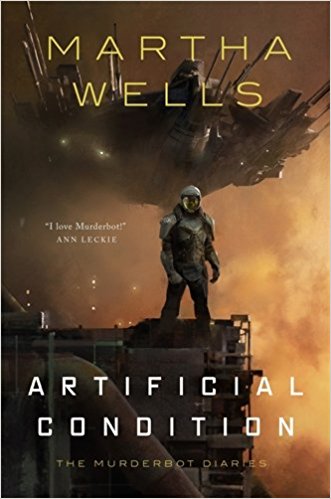
I enjoyed the first volume in Martha Wells’s Murderbot series, All Systems Red (you can read my review here), and was eagerly anticipating the next novel of a Security Robot who hacked his systems to free himself. Murderbot is on the run, but he also wants to know about the incident where he failed to protect his clients. On his journey, Murderbot meets another liberated robotic mind–a transport ship–who helps with the logistics. The story produces some tantalizing clues and some hints of a deeper plot. I’m fond of these TOR short novels–Artificial Condition is 158 pages–and the third volume of the Murderbot series, Rogue Protocol, will be shipped on August 7. Can’t wait! GRADE: B+
HANNAH ARENDT [DVD]

After reading Hannah Arendt’s Thinking Without a Banister, I thought I’d watch Hannah Arendt (2013), a DVD I’ve had on my shelves for years. Barbara Sukowa plays the intense, chain-smoking philosopher during the tumultuous period of Arendt’s life when she accepted the invitation of editor William Shawn (Nicholas Woodeson) of The New Yorker to cover the 1961 trial of Adolf Eichmann. Director Margarethe vin Trotta weaves actual archival footage from the famous trial into the story. Arendt’s articles in The New Yorker created a firestorm of controversy in the Jewish community. Her analysis of “the banality of evil” enraged many who wanted Eichmann painted as devil not as a bureaucrat who was “just following orders.” Arendt’s suggestion that Jewish leaders working with Eichmann during the Holocaust were complicit in the results unleashed consternation in Israel and the U.S. When the articles were published in book form, Eichmann in Jerusalem (1963), the book and its author became sensations.
While watching Hannah Arendt, I especially liked Janet McTeer as Mary McCarthy who encourages Arendt during this stormy episode when she’s being attacked on all sides. Barbara Sukowa creates a fiercely ethical woman who reports what she believes to be the truth and stands up to the Establishment while being lobbied by “friends” who want a specific political outcome. You can’t watch Hannah Arendt without admiring her integrity and courage during troubled times. GRADE: A-
THINKING WITHOUT A BANISTER: ESSAYS IN UNDERSTANDING 1953-1975 By Hannah Arendt
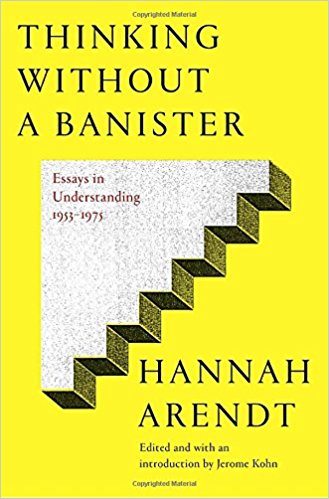
“How can anyone have an opinion who is not informed?” Hannah Arendt asks. “If everyone lies to you, the consequence is not that you believe the lies, but that no one believes anything at all anymore.”
That statement sums up where we are today with oceans of Fake News and “alternative facts” cascading over us daily. Amid all this confusion and chaos, reading Hannah Arendt’s essays both enlightens and refreshes my spirit. I’ve read Hannah Arendt’s books for decades. Arendt addresses issues of politics, freedom, and civil rights. Thinking Without a Banister covers a lot of ground. If I had to pick my favorite essay in this collection it would be “Is America by Nature a Violent Society?” Arendt doesn’t deliver easy answers or glib sound-bites. She gives you analysis and reasons for her opinions. Some of these essays are dated. I’m not sure many people want to read about the Hungarian Revolution (perhaps Wolf would), but the majority of the essays in this book discuss timeless topics like war, peace, and the pursuit of happiness. I highly recommend Hannah Arendt’s Thinking Without a Banister for relief in our troubled times. GRADE: A
TABLE OF CONTENTS:
Introduction by Jerome Kohn ix
Acknowledgments xxxi
Publication History . xxxiii
Karl Marx and the Tradition of Western Political Thought 3
I. The Broken Thread of Tradition 3
II. The Modern Challenge to Tradition 16
The Great Tradition 45
I. Law and Power 45
II. Ruling and Being Ruled 56
Authority in the Twentieth Century 69
Letter to Robert M. Hutchins 92
The Hungarian Revolution and Totalitarian Imperialism 105
Totalitarianism 157
Culture and Politics 160
Challenges to Traditional Ethics: A Response to Michael Polanyi 185
Reflections on the 1960 National Conventions: Kennedy vs. Nixon 192
Action and the “Pursuit of Happiness” 201
Freedom and Politics, a Lecture 220
The Cold War and the West 245
Nation-State and Democracy 255
Kennedy and After 262
Nathalie Sarraute 265
“As If Speaking to a Brick Wall”: A Conversation with Joachim Fest 274
Labor, Work, Action 291
Politics and Crime: An Exchange of Letters 308
Introduction to The Warriors by J. Glenn Gray 316
On the Human Condition 323
The Crisis Character of Modern Society 328
Revolution and Freedom, a Lecture 332
Is America by Nature a Violent Society? 355
The Possessed 360
“The Freedom to Be Free”: The Conditions and Meaning of Revolution 368
Imagination 387
He’s All Dwight 395
Emerson-Thoreau Medal Address 403
The Archimedean Point 406
Heidegger at Eighty 419
For Martin Heidegger 432
War Crimes and the American Conscience 433
Letter to the Editor of The New York Review of Books 434
Values in Contemporary Society 438
Hannah Arendt on Hannah Arendt 443
Remarks 476
Address to the Advisory Council on Philosophy at Princeton University 485
Interview with Roger Errera 489
Public Rights and Private Interests: A Response to Charles Frankel 506
Preliminary Remarks About the Life of the Mind 513
Transition 517
Remembering Wystan H. Auden, Who Died in the Night of the Twenty-eighth of
September, 1973 525
Index 535
LANGUAGE OF THE SPIRIT: AN INTRODUCTION TO CLASSICAL MUSIC By Jan Swafford
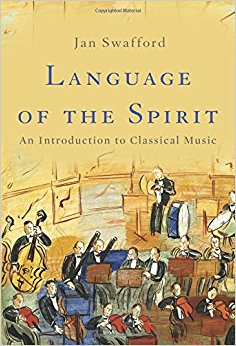
I’m always looking for well-written guides to complicated subjects. Language of the Spirit: An Introduction to Classical Music provides a handy one-volume book that covers the subject in enough detail to satisfy my needs. Swafford provides witty commentary and intriguing anecdotes about the composers. And at the end of each chapter, Swafford suggests musical pieces for further listening. If you’re looking for a concise, insightful commentary on great music, Language of the Spirit accomplishes those goals with a breezy style. GRADE: A
TABLE OF CONTENTS:
Table of Contents
Introduction vii
Part I Music from the Beginning
Chapter 1 Through the Middle Ages (up to 1400) 3
Chapter 2 The Renaissance (ca. 1400-1600) 13
Part II Baroque
Chapter 3 The Baroque Period (ca. 1600-1750) 19
Chapter 4 Claudio Monteverdi (1567-1643) 27
Chapter 5 Johann Sebastian Bach (1685-1750) 31
Chapter 6 George Frideric Handel (1685-1759) 44
Chapter 7 Further Baroque Listening 52
Part III Classical
Chapter 8 The Classical Period (ca. 1750-1830) 57
Chapter 9 Joseph Haydn (1732-1809) 66
Chapter 10 Wolfgang Amadé Mozart (1756-1791) 77
Chapter 11 Ludwig van Beethoven (1770-1827) 91
Part IV Romantic
Chapter 12 The Romantic Period (ca. 1830-1900) 107
Chapter 13 Franz Schubert (1797-1828) 114
Chapter 14 Hector Berlioz (1803-1869) 126
Chapter 15 Robert Schumann (1810-1856) 133
Chapter 16 Frédéric Chopin (1810-1849) 140
Chapter 17 Richard Wagner (1813-1883) 145
Chapter 18 Franz Liszt (1811-1886) 155
Chapter 19 Johannes Brahms (1833-1897) 159
Chapter 20 Pyotr Ilich Tchaikovsky (1840-1893) 170
Chapter 21 Antonín Dvorák (1841-1904) 175
Chapter 22 Gustav Mahler (1860-1911) 179
Chapter 23 Further Romantic Listening 186
Part V Modernism and Beyond
Chapter 24 The 20th and 21st Centuries (ca. 1900-present) 193
Chapter 25 Claude Debussy (1862-1918) 211
Chapter 26 Richard Strauss (1864-1949) 218
Chapter 27 Maurice Ravel (1875-1937) 223
Chapter 28 Igor Stravinsky (1882-1971) 229
Chapter 29 Arnold Schoenberg (1874-1951) 240
Chapter 30 Charles Ives (1874-1954) 250
Chapter 31 Bela Bartok (1881-1945) 258
Chapter 32 Dmitry Shostakovich (1906-1975) 266
Chapter 33 Benjamin Britten (1913-1976) 273
Chapter 34 Aaron Copland (1900-1990) 277
Chapter 35 György Ligeti (1923-2006) 281
Chapter 36 Further Modernist Listening 286
Conclusions 298
Suggested Further Reading 304
Index 306
JURASSIC WORLD: FALLEN KINGDOM

I’m sorely tempted to say the Jurassic series is getting long-in-the-tooth. Yes, the Jurassic series has been around for 25 years and the latest installment, Jurassic World: Fallen Kingdom, ratchets up the rampaging dinosaurs factor to hold the attention of jaded audiences. Chris Pratt returns as the dinosaur-whisperer. He joins Bryce Dallas Howard to try to save the giant saurians lurking around the trashed theme park on Isla Nublar when the island’s volcano erupts. Yes, Jeff Goldblum returns for a cameo as chaos theoretician Ian Malcolm (taking a break from analyzing the Trump Administration, perhaps). If you’re looking for a Summer popcorn movie, Jurassic World: Fallen Kingdom fits the bill. GRADE: B-
FRIDAY’S FORGOTTEN BOOKS #481: YEAR’S BEST SCIENCE FICTION NOVELS: 1953 Edited by Everett F. Bleiler & T. E. Dikty
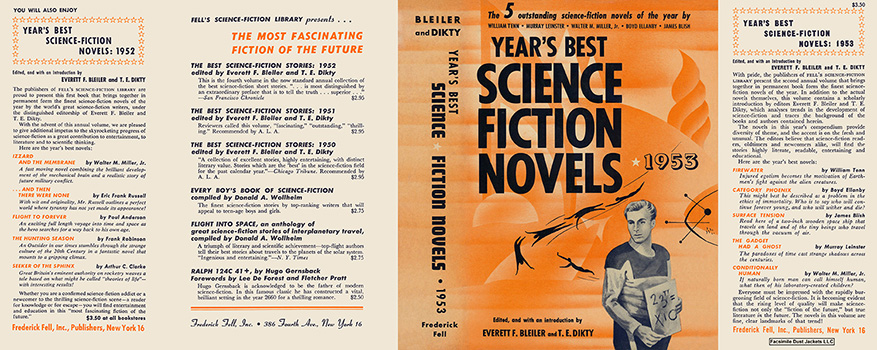
I read James Blish’s “Surface Tension” sometime in the early 1960s and was blown away. This story of a crashed generational starship captured the essence of the Future. The crew, knowing humans in their present form could not survive on a planet of mostly puddles of water, create a version of humans–tiny and aquatic–who could live in a puddle of water. What an amazing concept decades before genetic engineering was invented! Murray Leinster’s “The Gadget Had a Ghost” is both a mystery and a mediation on Time Travel. Walter M. Miller, Jr.’s “Conditionally Human” explores the ramifications of a controlled birthrate policy where “enhanced” pets are genetically designed to take the place of children. “Firewater” is another of William Tenn’s unique takes on Aliens and business. And “Boyd Ellanby” shows what can happen in a totalitarian society when a scientist invents life-extension technology. I enjoyed all the novellas in this collection! GRADE: A-
TABLE OF CONTENTS:
Introduction, by Everett F. Bleiler & T. E. Dikty 9
“Firewater”, by William Tenn (Astounding Science Fiction, February 1952) 17
“Category Phoenix”, by Boyd Ellanby (Lyle C. Boyd & William C. Boyd) (Galaxy Science Fiction, May 1952) 81
“Surface Tension”, by James Blish (Galaxy Science Fiction, August 1952) 131
“The Gadget Had a Ghost”, by Murray Leinster (Thrilling Wonder Stories, June 1952) 181
“Conditionally Human”, by Walter M. Miller, Jr. (Galaxy Science Fiction, February 1952) 251
POPS: FATHERHOOD IN PIECES By Michael Chabon

Patrick and Katie gave me a copy of Pops: Fatherhood in Pieces for Father’s Day. Since it’s a short book, I read Pops immediately. I’ve read several of Michael Chabon’s books over the years. Chabon won a Pulitzer Prize for The Amazing Adventures of Kavalier and Clay. Wonder Boys is a pretty good novel and a pretty good movie. The essays in Pops cover a lot of ground. I was especially impressed with Chabon’s tale, “My Son, the Prince of Fashion,” of taking his son, Abraham, to France for the Paris Men’s Fashion Week as a bar mitzvah gift. Chabon’s son loves fashion and Chabon shows that feeding a son’s enthusiasm pays off. I was less impressed with Chabon’s recollections of playing baseball as a kid in “The Old Ball Game.” But, the most moving piece in this collection is the final one: “Pops.” Chabon’s father was a physician and would occasionally take his son on his patient visits. You’ll see fairly quickly why Chabon didn’t follow in his father’s footsteps. Chabon manages to hit the right notes in these essays. I’m sure Pops will become a steady seller around Father’s Day for the next decade. GRADE: B+
TABLE OF CONTENTS:
Introduction: The Opposite of Writing 1
Little Man (aka, “My Son, The Prince of Fashion,” GQ) 15
Adventures in Euphemism (aka, “The Unspeakable in Its Jammies,” atlantic.com 45
The Bubble People (aka, “One of Us,” Details 53
Against Dickitude Details 63
The Old Ball Game Details 77
Be Cool or Be Cast Out Details 93
Pops 107
I FIND YOUR LACK OF FAITH DISTURBING: STAR WARS AND THE TRIUMPH OF GEEK CULTURE By A. D. Jameson
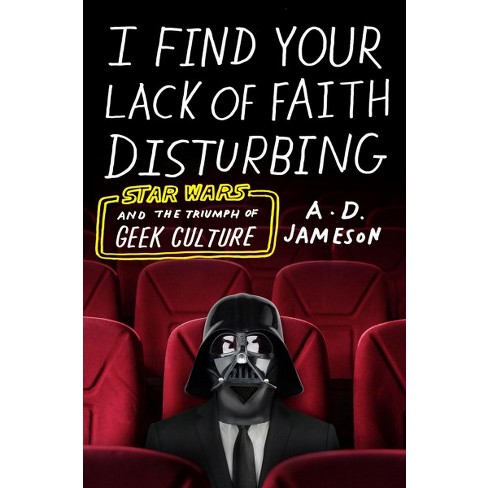
A. D. Jameson celebrates Geek Culture in I Find Your Lack of Faith Disturbing. Jameson shows how geeks came to dominate the best Box Office with movies like The Avengers, the Star Wars series, the Batman series, and Avatar. Comics, graphic novels, YouTube videos, and fan fiction affect an audience hungry for more content. But, amid this glorification of Geek Culture, I detect some cracks. The Solo movie just underperformed leading to speculation of “Star Wars fatigue.” How many MARVEL series can succeed on Netflix? Do people still want to see the rampaging dinosaurs in Jurassic Park movies? Are you a geek? Do you like Star Wars and MARVEL/DC super-hero movies? GRADE: B
TABLE OF CONTENTS:
Introduction: The Golden Age of Geekdom 3
Part I: The Story So Far
1. “Oh, I’m Back Out in Space Again”: The Realism of Star Wars 23
2. The Children of Spielberg and Lucas 43
3. Geek Goes Mainstream 65
Part II: What Every Geek Wants
4. Do You Bleed? 87
5. Historical Documents 111
6. The Great Geek Game 123
7. Geeking Out 157
Part III: To Be Continued . . .
8. I’ve Got a Bad Feeling about This: The Importance of Being Geeky 177
9. Why So Serious? 203
10. Back Out in Space Again: The Beauty of Star Wars 225
Notes 247
Acknowledgments 273
Index 275